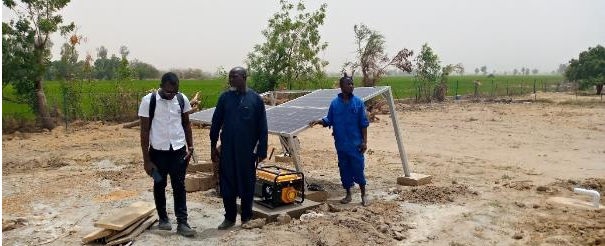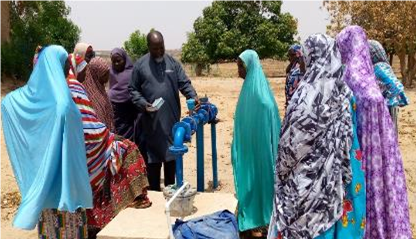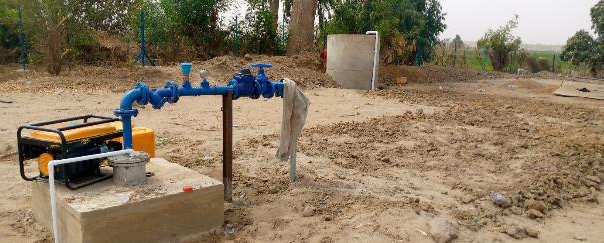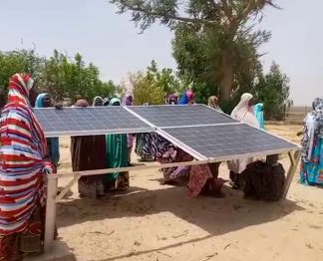Nexus Blog // Towards a feminisation of the Nexus Water-Energy-Supply concept in Kollo (Niger)
To help combat the effects of climate change, the Nigerien National Coordination of Users Natural Resources in the Niger Basin (CNU-BN/Niger), with support from German Cooperation by the Deutsche Gesellschaft für Internationale Zusammenarbeit (GIZ) and its Water & Energy for Food Project (WE4F), funded a water-energy-food nexus demonstration project for a group of 180 women in a village in the department of Kollo.

© GIZ
The Water-Energy-Food Security Nexus
Recurrent climate change phenomena are affecting the whole world with negative impacts on the environment, biodiversity, habitats and populations. These impacts manifest through numerous events, such as floods, droughts or diseases that contribute to food insecurity, bush fires and migration, among others. To counter these consequences and better cope with these impacts, mitigation and adaptation measures are developed. One of them is the introduction of the Water-Energy-Food Security Nexus, which allows the interconnection of the water, energy and agri-food sectors for increased food security. It is about solving the problems of one sector while integrating its corollaries into the others to ensure water security and economic progress through the development of new cost-effective and environmentally friendly technologies.
Niger is a country with a large amount of renewable (water, sun) and non-renewable (oil, uranium, etc.) natural resources. It has about 15 million hectares of arable land, a known irrigable potential of about 10,942,560 hectares, vast pastoral areas, considerable scope for improving the productivity of its main productions, and a young rural population that is growing rapidly (Ministère au Plan 2017). Niger's groundwater is estimated at 2.5 billion m³ of renewable water and 2,000 billion m³ of non-renewable water (Ministère au Plan 2017).

A WEF Nexus demonstration project
To help combat the effects of climate change, the Nigerien National Coordination of Users Natural Resources in the Niger Basin (CNU-BN/Niger), with support from German Cooperation by the Deutsche Gesellschaft für Internationale Zusammenarbeit (GIZ) and its Water & Energy for Food Project (WE4F), funded a water-energy-food nexus demonstration project for a group of 180 women in a village in the department of Kollo. The site is roughly 3 hectares large and surrounded by a rice paddy. The group benefited from four boreholes equipped with four pumps, four solar fields with a total of 22 solar panels, three generators as fall-back option and four tanks to fill a Californian irrigation grid. This demonstration project promotes clean energy and economical use of water resources to improve vegetable production for women's empowerment. When water from the storage tank is to be used for irrigation, it is released by gravity with a pressure that depends on the height difference between the tank and the irrigated area. In case of low solar energy coverage, generators will take over. This hybrid system will allow beneficiaries to increase their agricultural production while reducing labour and fuel costs.


To achieve sustainable management of the demonstration project, the CNU-BN/Niger accompanies the women's cooperative in the development and especially in capacity building. The additional support is co-financed by the European Union (EU) and the German Ministry for Economic Cooperation and Development (BMZ) through the Nexus Regional Dialogue in Support of the NBA project of GIZ. The overall objective is to promote the Nexus approach in the development of the site for the women's group. More specifically, the objective is to build the capacity of the beneficiaries in innovative concepts for the rational use of water and energy resources and to have access to agricultural inputs to increase production.

At the handover of the construction work done on the site, the women were filled with priceless joy to the point of singing and dancing to show their gratitude to the financial and technical partners. They declared: “Our dream has just come true!”
The President of the group, Ms Amina, said: “We are honoured by the realisation of these facilities, we are proud because our sufferings have come to an end. Before, we were obliged to bypass the canal of the Rice Cooperative, without their knowledge, so that we could fill the small basins that we had dug in the ground. Now we have four equipped boreholes, four ponds, a water distribution system and even four carts and four donkeys to transport the motor pumps and the women, because of the distance.”
To rationalise the use of water and avoid over-pumping, the women beneficiaries explained: "We will organise ourselves for an economical watering in water and time but also for the security of the inverter which is installed contrary to the individual watering." In addition, close coordination and monitoring with the technical services for agriculture, hydrology and environment of the department of Kollo are organised since the beginning of the project. To optimise the capture of solar rays by the installed panels, the women have been informed and trained on the maintenance of the solar panels. Regular maintenance of the panels is necessary to maintain a good level of efficiency. Without the regular maintenance of the installation, a significant decrease in the yield of the solar panels is possible, especially due to dust and dirt deposits. Therefore, for the daily operation of the pumping system, four (4) women from the group were also informed and trained on how to operate the system and maintain the solar panels.
Pour la version française de cet article, voir ici.
Related articles
- Nexus Blog // Food Security and Women Empowerment Through Solar-Powered Irrigation in Niger
- Project // Water & Energy For Food (WE4F): A Grand Challenge For Development
- Nexus Blog // The double-edged sword of solar-powered irrigation systems
